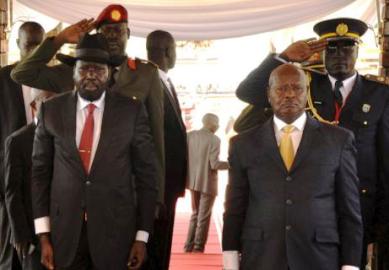President Kiir says he closes “coup chapter”
July 9, 2015 (JUBA) – South Sudanese leader, Salva Kiir, on Thursday offered that he forgave the former detainees led by former secretary general of the ruling SPLM party, Pagan Amum, whom he accused of attempting military coup against his government in December 2013, saying he now closed the “coup chapter” and opened for them a “new chapter” back under his leadership.

He made the remarks while delivering his speech during the commemoration of the 4th independence day of the country.
Pagan Amum, who president Kiir reinstated back to his previous position as party’s secretary general, arrived on Wednesday from Nairobi with five other politicians of former detainees, and attended the launch of president Kiir’s extended three years term of office.
President Kiir repeatedly referred to the 15 December 2013 onset of war as a “coup attempt” during his speech to parliament on Wednesday and Thursday during the celebrations of independence.
Amum and ten other senior members of the SPLM party were arrested and detained for four months before being released to the custody of Kenyan president Uhuru Kenyatta in April 2014.
As part of SPLM reunification agreement signed in January this year, Amum, former cabinet affairs minister, Deng Alor, former finance minister, Kosti Manibe, former justice minister, John Luk, Cirilo Hiteng, former youth minister, Madut Biar, former telecommunication minister, Gier Chuang, former interior minister and Chol Tong Mayai, former governor of Lakes state arrived to Juba on Wednesday to stay. The group left behind other two members in Nairobi, including former security minister, Oyai Deng and former deputy defence minister, Majak Agot.
President Kiir also called on his former vice president turned rebel leader Riek Machar, to take peace talks seriously and end the war, saying he heard the cries of South Sudanese for peace.
“As your president, I do hear your cries for peace,” he said adding that “I will not rest until peace is achieved in South Sudan.”
Ugandan president Yoweri Kaguta Museveni was the only head of state to attend South Sudan’s 4th anniversary, which has been overshadowed by the 19-month old conflict.
President Museveni in his speech blamed what he described as “wrong ideologies” for igniting the conflict in South Sudan, just two and half years after gaining independence from Sudan.
“The people of South Sudan, the people Africa have suffered for long for wrong ideologies,” said Museveni.
The Ugandan leader squarely blamed British, Portuguese and France colonial powers for punishing Africans through divide and rule policies during the colonial times.
For South Sudan, he said, the Arabs continued to “enslave” the Africans after independence from Britain in 1956. He said South Sudanese should now stop tribalism and sectarianism from destroying their hard won independence.
“Ideas of tribalism, of sectarianism are wrong ideas. Ideology of tribes, religion is a wrong ideology,” he said.
He also advised president Kiir’s government to exercise forgiveness, saying when you punch your brother harder and was about to fall into a deep hole, one should not allow him to fall but lift him up. He was also referring to the former detainees.
He jokingly said “what brought rebels here” in Juba to celebrate the independence day when he saw members of the former detainees.
He also advised that it was not right for a brother to take side when two brothers were fighting.
President Museveni, who is widely seen as mentor of president Kiir in the region, sent thousands of Ugandan troops backed by tanks and helicopter gunships since January 2014 fighting alongside president Kiir’s government against those of Riek Machar at the onset of the war.
The Uganda People’s Defense Force (UPFD) have remained in the country despite repeated calls from the rebels for their withdrawal as a condition for a bidding ceasefire agreement.
(ST)
